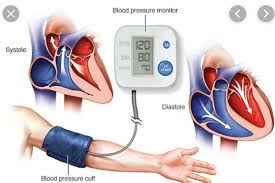Source: monitor.co.ug
A new research has shown that one in four adults in Mukono and Buikwe districts have hypertension.
Also known as high blood pressure, hypertension is a long-term medical condition in which the blood pressure in the arteries is persistently elevated.
The research conducted by Makerere University’s School of Public Health revealed that only 2.8 per cent of those hypertensive were aware of their status.
Researchers interviewed about 4,372 people.
Dr Geofrey Musinguzi, the principal investigator Scaling Up packages for Cardiovascular diseases prevention in selected sites in Europe and Sub-Saharan Africa, School of Public Health, revealed that they have trained more than more than 20 health workers and community health workers to create awareness about the risky behaviour and also to profile risk factors of non-communicable diseases (NCDs) including hypertension using non laboratory tools and make referrals.
He made the remarks during the dissemination of the results on the progress of implementing a comprehensive cardiovascular disease prevention programme in Buikwe and Mukono district by School of Public Health, Makerere University.
NCDs, also known as chronic or life style diseases are diseases that are not easily transferable from one person to another either through direct contact or vectors, they are increasingly becoming common in Uganda due to unhealthy lifestyle, according to Ministry of Health.
Over 7,000 new cases of diabetes were recorded at health facilities in Uganda in 2009-10 compared to 58,523 five years earlier showing an increase of 27% (HMIS data 2009/10). In 2013, the Uganda diabetes association revealed that over 200,000 children had diabetes and expressed concerns the number could be higher because many of the children do not report to hospital for diagnosis.
At the same event, Dr Jospeh Okware, the commissioner Quality Assurance and Inspection at the Ministry of Health said patients battling with high blood pressure and other NCDs will soon purchase drugs at a cheaper price.
Dr Okware explained that NCD drugs have been not readily available at health facilities since initially there was no specific budget to purchase them which has seen patients purchase the drugs from pharmacies at a higher price.
“The time our health system was designed, our system was designed to manage communicable diseases because there were very few patients with NCDs like hypertension. So you find the medicines that were procured…were predominantly to treat these communicable diseases …,” Dr Okware said.
Government has already agreed on a partnership with Norvatis, a drug company which will ensure supply of NCD drugs at a cheaper cost of Shs3, 661($1) per patient per month to increase access and affordability of these drugs and this is expected to roll out soon.
“Right now if you have hypertension and you went to a clinic you are likely to get one or two types of medicine and the dose for probably one month would cost you from 18,000 up to 25,000 shillings in the pharmacy….,” Dr Okware said
Government has allocated Shs4 billion to National Medical Stores to specifically purchase NCD drugs.
